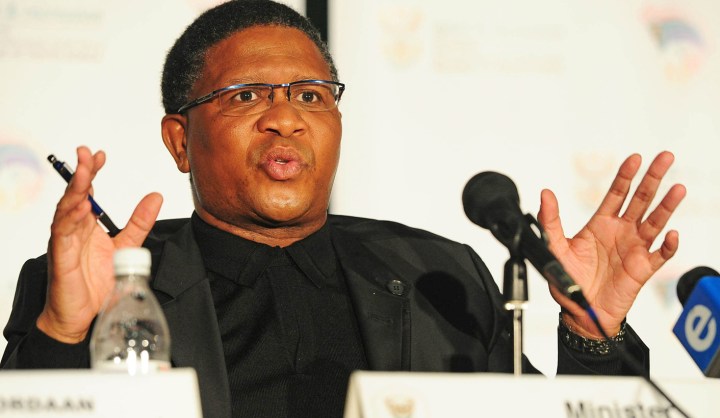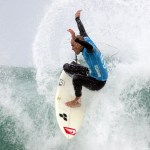Sport
Quota, un-quota: Mbalula’s ‘Constitution? What Constitution?’ moment

South Africa’s Sport Ministry on Monday dropped a quota bombshell which had many up in arms. The shallow words looks like nothing more than a little bit of electioneering, but the proposed systems are also unconstitutional and will do nothing more than stall the progression they pretend to encourage. By ANTOINETTE MULLER.
What a difference a week makes, especially a week close to elections.
Fikile Mbalula has suggested that the elite sports teams who do not field 60% black players will be banned from representing South Africa. These decisions were taken by the Department of Sport following a meeting between Sport Minister Mbalula and the sports MECs on Saturday.
This completely contradicts the Minister’s previous comments. In 2011, Mbalula said: quotas are exhausted and have generally been counter-productive. Last week he said: the quota system is unsustainable and counterproductive. How quickly things change.
The proposals, which will apparently be implemented immediately, are not clear in their requirements. There is no indication of what racial groups “black” refers to. The sporting bodies themselves even indicated that they had not been contacted to have the proposals explained – that should tell you everything you need to know about the shallow nature of it all.
These resolutions come on the back of a pilot report which found that, to nobody’s surprise, transformation in South Africa was still lacking and the facilities at grassroots level were shocking – a fact that has been completely glossed over by the Ministry.
As it stands, there aren’t “quotas” per se. There are BEE expectations, but the tangible and visible results – the stuff that’s good for election propaganda – is still lagging behind because of the failure at grassroots level.
The report took into account skill and capability development, demographic profile, performance, contribution to government priorities and good governance and was given a percentage score out of 100. Rugby was the best performer with 71%, followed by cricket (65%), football (40%), netball (37%) and athletics (22%).
When it comes to representation, though, that’s where things got a bit more complex. The representation for players of colour overall was referred to as “generic black” and “black African” with both categories being taken into account.
Across the different levels of Test, ODI, T20 and Under-19 cricket, CSA scored 3.5 on the “black African” category and a perfect ten for “generic black”. Rugby scored 3.4 on the “black African” category and 7.8 on the “generic black” category for their competitions, ranking from Springboks to Under-19s.
Many will argue that in a country with a population of over 80% “Black African”, this is not good enough. However, to punish national teams for failure at grassroots level is just one of the problems with the Ministry’s suggestion. The same report also found that adequate facilities at school level are less than one per school and that school sport is collapsing in many areas. It is therefore not surprising that the representation at national level is so poor, but it’s easier to perpetuate a shallow fix for failures rather than take responsibility for them. It’s like taking a plaster to a gaping wound.
The failure to support grassroots infrastructure isn’t the only problem with the radical suggestion of quotas. The majority of sports have a code of conduct that will force immediate expulsion when politicians interfere with selection. So, while the proposed representation of teams might fit the political agenda, the threats are idle and will be nothing more than shooting everyone in the foot and stalling progression.
Implementing this kind of ruling is also entirely unconstitutional. It can, should and most likely will be challenged in the ConCourt if it is implemented. BEE is not exactly the same as quotas. Players are not “interviewed” as such; the interview process happens at domestic level. This is where quotas of some sort aren’t the worst idea and could be considered in line with the Rooney Rule in America. A forced implementation of such a system at national with the threat of funding cuts and the lot is discrimination which then becomes an employment issue and can be challenged in court.
Furthermore, threats of blocking sponsorship could be considered a restraint of trade. Legally, a system like this, in a modern and democratic South Africa, holds little water. From the outside looking in, it looks like nothing more like subtle pre-election campaigning.
The system is further flawed in its social and psychological constructs and will only marginalise players of colour even more. The psychological impact that “only being there because you’re a certain colour” is brutal on young players and will forever make them doubt their real abilities. That kind of psychological impact can destroy careers, the same careers the ministry is trying to promote.
Some might take a leaf from Charl Langeveldt’s book and refuse to play if they are selected based only on their skin colour. Or, perhaps, the marginalisation of sportsmen of colour will continue to deconstruct team cohesion, friendships and the general sense of unity that sport can foster.
With so many flaws in the suggestion, it would seem almost impossible, even satirical, for such measures to be implemented. But then, that is how electioneering – and politics – in South Africa seems to narrate itself – something often beyond belief.
Nobody can argue that it would be great to have teams that are more representative at national level: that would be true progress and a victory for democracy. The proposed plan to get there, however, is foolish, selfish and in complete contradiction to what democracy stands for. DM
Photo: Sports Minister Fikile Mbalula briefs journalists on the international friendly between Bafana Bafana and Brazil during a news conference, Thursday, 6 March 2014. Picture: GCIS/SAPA



















 Become an Insider
Become an Insider